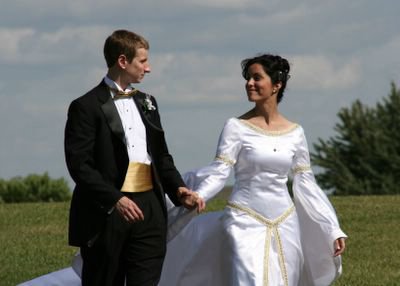Who'd a thunk it?
OK, so I'm working on a more comprehensive of noteworthy quotations from The Mouse That Roared, but this one was too good to pass up.
Anybody know of any other place that sounds like this?
"It seems that Disney wanted a particular type of student to attend, as indicated in the detailed dress codes it provided for both men and women. The men were to wear a suite with a color-coordinated shirt; the suit fabric was to be one 'traditionally accepted for business.' No necklaces, bracelets, or earrings were allowed, nor were male [college] students permitted to have a mustache, beard, or hair 'beyond or covering any part of the ears.' No one was to show up with an 'extreme look, including shaving the head or eyebrows'...Women were to wear a suit, a dress, or a pants outfit...No more than two necklaces could be worn, and these were not to exceed thrity inches in length. And in case these young women missed the point, they were not to wear more than one ring per hand."
But wait, folks, that's not all.
"Pedagogically, employees are given written quizzes on Disney rules. One pedagogical strategy includes exposing workers to an endless chant of inane Disney mottos such as "We work while others play!" "We never say no because we know the answers." And "We smile that extra jmile."
And best of all...
"'Supervisors in Tomorrowland are...famous for...hiding in the bushes above the submarine caves, timing the arrivals and departures of the supposedly fully loaded boats making the 8 1/2 minute cruise under the polar icecaps...In short, supervisors...are regarded by ride operatos as sneaks and tricksters out toget them and representative of the dark side of park life.'"
All right, so it's not entirely parallel, but the similarities are striking.

8 comments:
Hmm--doesn't sound like any place I have ever heard of. :-)
Still, I cannot necessarily blame Disney here, since they are a business, consciously creating an image in order to sell a product. That's just plain good business. Other companies do it, although not on the same scale.
However, as to our unnamed place, I'm not so sure the justification holds. Is it trying to sell a product? If so, what kind, and why? That raises both moral and prudential issues...
Anyone wanting to take this further might want to see a certain rhetoric professor's dissertaion...
And where might we obtain said dissertation?
I suppose to be fair to the author, I ought to include the point of documenting all of this.
He wraps up the section with this observation: "There is more going on here than an old-fashioned prudishness. There is a measure of control that is excessively regulating and authoritarian. Furthermore, Disney's selective hiring practices appear consistent with its homogeneous, sanitized theme parks: each facet of the Disney experience is aimed at reassuring 'guests,' who increasingly experience the desire for social and spatial isolation, that they will not have to deal with difference."
So his beef with Disney isn't that it's trying to present a particular image, but what the implications of the image are, why it's being presented, and the extent to which it strips identity from the participants. He concludes the chapter with this: "Disney's education practices should be understood as part of a broader assault on public dicsourse, which dispenses with the principles of autonomyt, critical self-reflection, and self-determination."
I'm getting the distinct feeling that any time this author says "democracy" he really means something more like what I've been taught is socialism.
Besides a socaialist, the author is an elitist snob. From his platonic guardian's view, the masses are enchained by their own desires for a clean, safe, escape on their week of vacation. Having discovered greater things (greater, of course, by his definition) he wants to ensure (by force) that the masses are elevated in their taste for vacation.
Oh, and did you notice his complaint that Disney works against autonomy and self-determination? I guess automony is good so long as you don't use your autonomy to go to the Magic Kingdom.
Either that, of as a socialist, he hates the fact that Disney has made a business decision and is reaping the benefits of it. As a greedy capitalist pig, I like "selling a product," at least in most contexts. I'm not so sure in reference to our yet unnamed place.
Well, if you're interested in how well the "business plan" made an impression on the "customers" of our "unnamed place," see http://www.studentsreview.com/SC/BJU_c.html#comments/. Some of the "customers" obviously have an axe to grind, but many of them take legitimate issue with the "business plan."
student reviews of BJ
Sorry; forget thay comments don't automatically hyperlink. See if I remember any of the html my poor brother tried to teach me in 7th grade...
All right, Bard, slow down. I'll be first in line to pick capitalism over socialism, but that doesn't mean that there aren't any legitimate critiques of it. I think the guy's got some decent points. Sure, you consider his point of view and take it with a grain of salt, but have you read this book? He doesn't ever say anywhere in there that people shouldn't consume Disney products or that Disney shouldn't be allowed to make money or that people shouldn't go to Disney Land. His point is that people should learn to really "see" what Disney's doing and learn how to process (read "deconstruct") it better.
Post a Comment